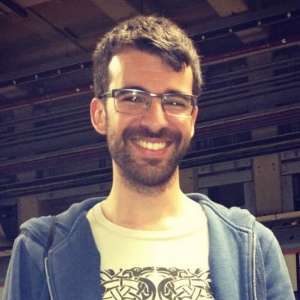Music has always had an eerie ability to bring back to life what seems dusty and buried. In a traditional Japanese story (adapted to the screen by Masaki Kobayashi in his masterpiece, Kwaidan), Hoichi, a young blind musician, visits the ruins of an ancient palace every night and performs the epic tale of a long-forgotten battle in front of a ghastly audience of noble shadows. Animated memories take over the old house through the power of music, dangerously bridging the unfathomable void between two distant worlds. Opera, since its Orphic origins, has used this mysterious power to push the limits of perception and reveal what other forms of art can only suggest. In his new opera, premièred last summer in Aix-en-Provence, Portuguese composer Vasco Mendonça (b. 1977) also tries to haunt a house that in the end was not completely taken over by his music.
Casa Tomada, the short story that inspired this opera, is an extraordinary sample of Argentine writer Julio Cortázar’s dark, ironic, and enticing literary style. A brother and a sister, the childless successors of a proud family line, are the only residents left in the old family house. They ritually perform the daily chores that prevent the decay of the house and delay the fading of the memories it contains, until one day a shapeless presence takes over a part of the house, forcing the siblings to dwell on the other wing, separated by a locked door. The libretto, written by British author Sam Holcroft, skilfully plays with this material, challenging the unreliable narrator of the tale (the brother himself) and developing the character of the sister. She also tries to add elements to the action, in a half-accomplished effort to provide a fluid storyline more suitable to the operatic form. However, although the libretto honours the ambiguity of Cortázar’s story, every additional detail steals away some of its unspoken mystery, making explicit the whispered hints of the original.
For this fascinating tale, Mendonça has crafted an eclectic score which proves his talent and hard work, but maybe does not show yet a fully mature, identifiable artistic voice. The music is at its best in the more static, descriptive moments, when the hidden riddles of the house are revealed through sinister waves of the strings and unnatural percussion. The vocal line is well developed and shows attention and care, although it might appear a bit conventional, lacking a true exploration of vocality. On the whole, even if the resources of the chamber orchestra are correctly exploited, one might wish for less self-restraint and more lyrical ambition.
Le Grand Théâtre de Luxembourg, as a co-producer of this commendable project, presented for these performances the same artistic crew that brought the piece to life in Aix-en-Provence less than a year ago. Etienne Siebens and the orchestra Asko|Schönberg, both proven specialists in contemporary opera, gave a precise and transparent rendition, making comprehensible all the layers of the score, which is usually the best choice for presenting new works. Oliver Dunn has a pleasant lyric baritone voice and moved comfortably along his gently written vocal part. Dramatically, although he perfectly presented the basic traits of his character, he failed to build up the complex evolution that the story and the libretto demand. On the other hand, Kitty Whately, a promising British mezzo-soprano, was more sure and convincing on stage and had moments of fine singing, as was the case of the uncanny lullaby of the first act.
But above all, it was the work of Katie Mitchell, one of the most prominent names in British contemporary theatre, which gave the performance a sense of unity and visual boldness that might have been missed otherwise. She scaled down her dramatic language to create an intimate atmosphere that perfectly matched the music and the story, especially thanks to Alex Eales’ hyper-realistic but uneasy set design and James Farncombe’s intelligent use of lights. Her conception of gesture and time challenges naturalism and magically kindles in the audience the promise of a different reality. At one moment, dust started to silently fall down from one point of the ceiling in the deserted living room, right after being taken over, which condensed the essence of the opera in an unforgettable image. Memories, decay, time and dry, infinite sadness. As Cortázar himself could have said, “I will show you fear in a handful of dust”.


